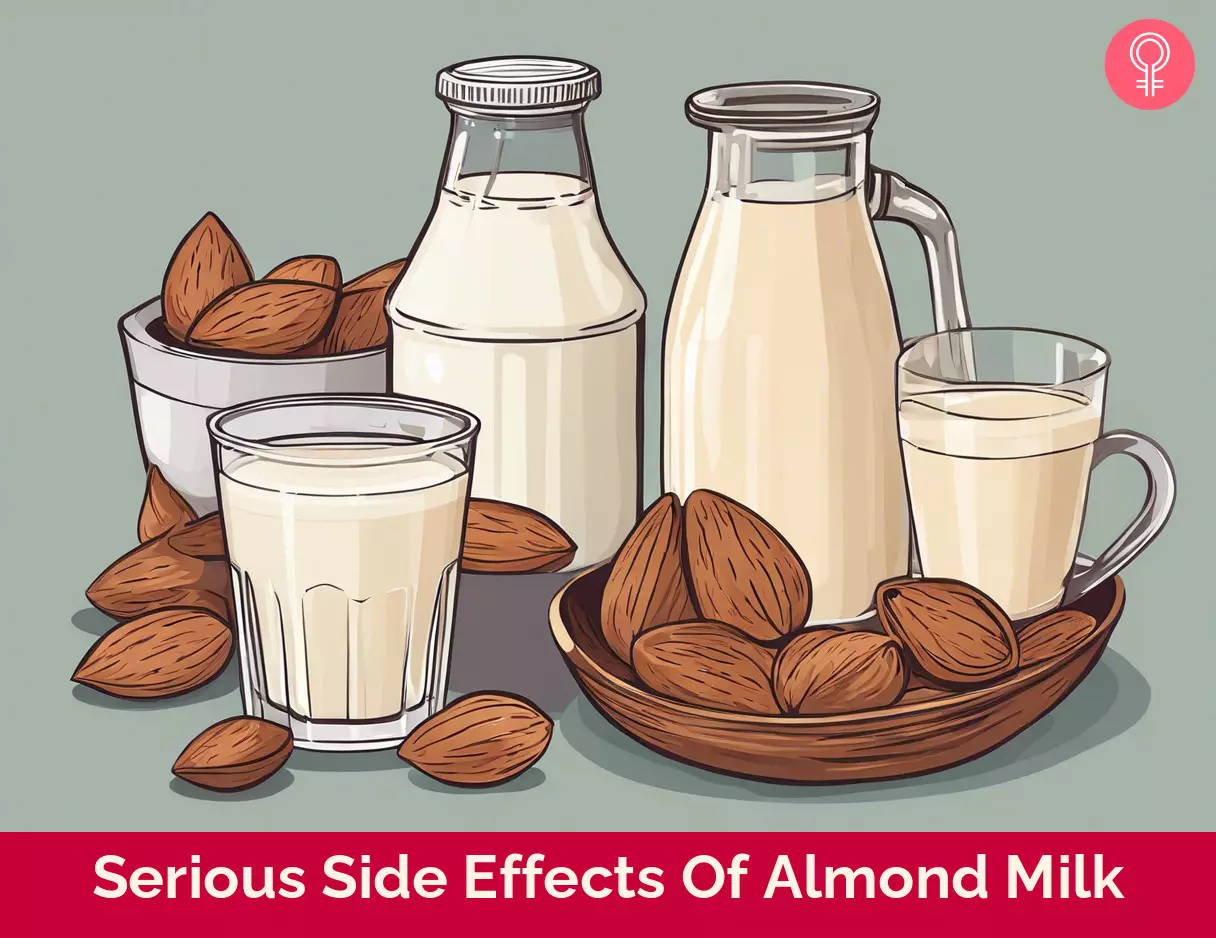Side Effects Of Almond Milk
Understanding almond milk side effects will let you know why you shouldn’t drink it alone as a substitute for regular milk. Drug Interactions None. When To See A Doctor In case of digestive issues such as diarrhea, wheezing and troubled breathing, severe deficiency, swollen thyroid gland, and skin irritation.
1. Nut Allergies
Almonds are a part of the list of the most popular allergic nuts; hence, consumption of almond milk by anyone with nut allergies can lead to swelling in the facial region, anaphylaxis, nausea or diarrhea (1).
2. Effects On Thyroid Gland
Almond is a goitrogenic food, which means that it contains substances that can affect the thyroid gland. It can affect the iodine assimilation by the gland and thus lead to the enlargement of this gland (2). A counter view is that consuming almond milk can boost one’s immunity power. However, in the light of this side effect, one might be forced to think otherwise as it can easily lead to thyroid dysfunction.
3. High Sugar Levels
Almond milk contains sugar which does not make up for nutrient deficiencies and can lead to harmful effects on one’s health, such as weight gain, if consumed in excess.
4. Childhood Issues
Many people think that almond milk can ensure the healthy development of a baby and thus feed it to them. However, it has been found that the consumption of almond milk might not display any impact on their health in the beginning but could lead to complications in the later run (3).
5. Milk Allergies
People who are allergic to lactose can also have side effects of almond milk if consumed in excess. Such people can have allergic reactions after consuming almond milk and hence, avoid having it completely.
6. Skin Reactions
Consuming almond milk can lead to skin rash and reactions like itching, eczema and hives. These reactions mostly appear within 10 minutes to 1 hour of having consumed the flavored milk.
7. Abdominal Issues
People who are allergic to almond milk might have to face abdominal cramps as it could become difficult for them to digest this milk (4).
8. Breathing And Respiration Issues
The side effects of almond and its milk include breathing and respiration issues, such as wheezing and breathing difficulties. This could be more frequently seen in the cases of people who are asthmatic or have any other issues with their breathing (5).
9. Digestive Troubles
The people who are unable to digest almond flavored milk could have allergic symptoms like diarrhea or vomiting. Jesse Feder, Clinical Dietitian at the Memorial Regional Hospital South, says, “Almond milk will most likely not cause bloating or gas when consumed.” He adds, “However some people may be intolerant to the typical preservatives or thickeners in almond milk. Specifically, the thickener carrageenani A naturally-occurring thickening agent found in red seaweed that is used by manufacturers but may harm the digestive system. has been known to cause intestinal bloating and gas when consumed.”
10. Cold-Like Symptoms
Almond milk allergies could also lead one to face symptoms like runny nose, wheezing combined with breathing troubles. These are more prominent in people who have nut allergies; but could also be due to any other allergies as well. So, if one has any such allergy already, almond milk should be consumed carefully.
11. May Increase Risk Of Kidney Stones
Almond milk is a popular dairy-free alternative, but its impact on the kidneys is worth noting. Almonds contain oxalates, which are naturally occurring compounds that can contribute to kidney stone formation when consumed in excess (6). Almond milk may contain some oxalates, although in lower concentrations compared to almond nuts themselves. However, compared to other plant-based milk alternatives, it has the highest oxalate concentration (7). Thus, if you have a history of kidney stones or concerns about your kidney health, it is recommended to consult a healthcare professional who can provide personalized dietary recommendations to prevent any potential risk while enjoying the benefits of almond milk. A delicious drink like almond milk, on the face of it, appears safe and healthy. However, the above listed points tell a different story! So, it is important that one consumes almond milk with caution and sparingly, not making it a part of our daily diet without consulting your doctor. Following this can permit one to enjoy it and even keep almond milk effects at bay. Can almond milk flare up IBS? Check out the infographic below to learn about the major side effects of almond milk.Illustration: StyleCraze Design Team Almond milk will most likely not flare up any IBS symptoms. However, if the almond milk you have is sweetened and has thickeners/preservatives, you are more likely to experience an IBS flare-up. Jesse Feder suggests having almond milk with limited ingredients, preferably almonds, filtered water, and added vitamins. He adds, “I treat clients with IBS, and they have had flare-ups from certain almond milk with these added thickeners/preservatives. After they switched to almond milk without them, they have told me they have yet to experience any IBS flare-ups from their almond milk.” Does almond milk make your breasts bigger? Almond milk doesn’t make your breasts bigger. While it contains estrogeni A hormone released in a woman’s body that regulates her menstrual cycle and contributes to the growth of pubic, armpit, and breast hair. which helps rebalance hormones as women approach menopause, due to which they experience hormonal imbalance, it has little impact on the body compared to the naturally produced estrogeni A hormone released in a woman’s body that regulates her menstrual cycle and contributes to the growth of pubic, armpit, and breast hair. hormone. Does almond milk reduce testosterone? The intake of almonds may boost sex hormone-binding globulin (SHBG), which binds to testosterone and reduces testosterone levels in the body (8), (9). How does almond milk compare to dairy milk? Almond milk is plant-based and is naturally lactose-free, while dairy milk is derived from animal sources and contains lactose. This makes the latter unfit for those who are lactose intolerant. As for their nutrient profile, 100g of unsweetened almond milk contains 19 kcal energy, 0.66g protein, and 1.56g fats (10). Whole dairy milk, on the other hand, contains 60 kcal energy, 3.28g protein, and 3.2g fats (11). So, almond milk is lower in calories and fat but has less protein content.
Illustration: Serious Side Effects Of Almond Milk
Discover the 6 shocking side effects of almond milk you never knew about. Learn how this popular milk alternative can affect your health. Scroll down to learn more.











![]()

